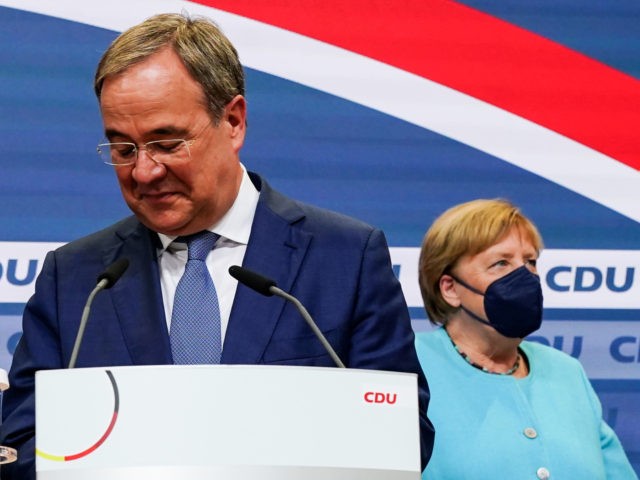Angela Merkel’s party has suffered its worst-ever election results in Germany’s federal elections, according to preliminary results.
Her notionally centre-right Christian Democratic Union (CDU) party and its allied Bavarian sister party the Christian Social Union (CSU) appear to have taken 24.1 per cent of the vote share, down 8.8 per cent from the last election — their worst result since the dawn of the post-war democratic era in 1949, when they took 31 per cent in what was then West Germany.
The left-wing Social Democratic Party (SPD) seems to have edged ahead of them with 25.7 per cent of the vote share, up 5.2 per cent from their last rather poor outing in federal elections.
While the two parties are currently in a so-called “grand coalition” government under Chancellor Merkel’s leadership, it is unlikely — although not impossible — that such an arrangement will continue, with both claiming a mandate to govern and looking to Germany’s more minor parties to form a coalition.
Germany, preliminary final result:
SPD-S&D: 25.7% (+5.2)
CDU/CSU-EPP: 24.1% (-8.8)
GRÜNE-G/EFA: 14.8% (+5.8)
FDP-RE: 11.5% (+0.7)
AfD-ID: 10.3% (-2.3)
LINKE-LEFT: 4.9% (-4.3)
…+/- vs. 2017
Result map @DecisionDeskHQ: https://t.co/vXUzAbgoqS#Bundestagswahl21 #btw21 pic.twitter.com/6f8y1zCFqk
— Europe Elects (@EuropeElects) September 27, 2021
Armin Laschet, the intended centre-right successor to Mrs Merkel, who announced she would step down as Chancellor after a new government is formed — although this may leave her in power as a so-called caretaker for months while coalition talks are ongoing — will be looking to a ‘Jamaica Coalition’ of the CDU-CSU, Greens, and the Free Democrats (FDP), so-called because the parties’ traditional colours of red, green, and black match those of the Jamaican flag.
SPD leader Olaf Scholz, meanwhile, will be looking to a ‘Traffic Light’ coalition of his party, the Greens, and the FDP, with a more straightforwardly leftist coalition of the SPD, Greens, and Marxist Left Party (Die Linke) now looking less likely than it did previously due to support for the Left being down to 4.9 per cent in the preliminary results — dangerously close to the cut-off for receiving any seats in the German parliament at all.
The FDP, who have often enjoyed the role of kingmaker after German elections, are a market-liberal “pro-business” party — FDP politicians backed Federal Employment Agency chief Detlef Scheele’s call for 400,000 migrant workers a year to meet bosses’ demands, for example — would prefer a Laschet-led coalition.
The left-wing Greens, however, with a slightly larger share of the vote than the FDP in the preliminary results, would prefer a Schloz-led government, meaning that the country is likely in store for a great deal of political horse-trading before a deal can be struck one way or another.
Notably, the CDU-SPD “grand coalition” following the last election came as a result of the FDP and Greens being unable to compromise over immigration, with the former unwilling to agree to the latter’s demands for an increase in family reunion chain migration for asylum seekers and refugees, despite its support for an influx of foreign workers.
Both major parties have ruled out working with the populist, anti-mass migration Alternative for Germany (AfD) party, which seems to have suffered a small fall in support, in any way.
Germany, preliminary final results:
West | East
SPD-S&D: 26.4%|24.2%
CDU/CSU-EPP: 25.9%|16.9%
GRÜNE-G/EFA: 15.4%|10.9%
FDP-RE: 12.0%|9.7%
AfD-ID: 8.2%|19.1%
LINKE-LEFT: 3.6%|10.0%#Bundestagswahl21 #btw21
Results live @DecisionDeskHQ: …-federal-elections.decisiondeskhq.com pic.twitter.com/eC855lvJeY— Europe Elects (@EuropeElects) September 27, 2021

COMMENTS
Please let us know if you're having issues with commenting.